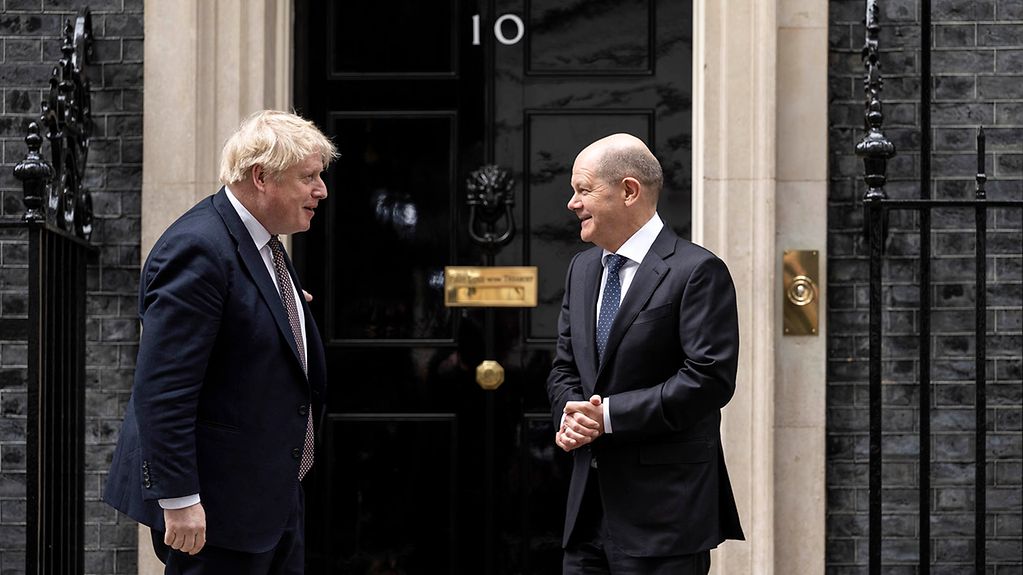The Federal Chancellor in England
Meeting in 10 Downing Street: Prime Minister Johnson welcomed the Federal Chancellor to his official residence in London. The talks focused on the invasion of Ukraine.
4 min reading time

The Federal Chancellor paid his first official visit to London.
Photo: Federal Government/Bergmann
The key facts in brief
- On his visit to London the Federal Chancellor praised the unity shown by the western allies in the face of Russia’s war of aggression. Putin had not reckoned with it, he said.
- Scholz stressed that Germany was sending a constant supply of weapons to Ukraine in order to boost their defences against the Russian invaders.
- The Federal Chancellor and the Prime Minister agreed that the governments of their two countries would hold consultations no later than 2023. Meetings of this kind have not been held before.
“The United Kingdom and Germany have long been partners, allies and friends. We will continue to be so, even though our friends decided some time ago that they no longer wished to be part of the European Union,” said Federal Chancellor Olaf Scholz following a meeting with the British Prime Minister Boris Johnson in London on Friday.
Dismay at Russia’s barbaric war
“Over the past days and weeks we have both looked eastwards with dismay and outrage at Russia’s illegal invasion of Ukraine,” Scholz went on, stressing that the war was causing death, unimaginable suffering and terrible devastation to Ukraine.
Scholz expressed his shock at the images this week from Bucha, Mariupol and other areas. “This is a barbaric war that is causing terrible destruction. It is claiming many citizens as its victims.”
Putin responsible for war crimes
The Federal Chancellor stated that killing civilians was a war crime, and that “the Russian President bears the responsibility for these crimes.” Scholz stressed that he and Prime Minister Johnson were absolutely as one in this assessment. He made it clear that: “We also believe that we are in complete agreement with large parts of the global community where law and morality are still accepted as a benchmark.”
Supporting Ukraine’s defences
The Federal Chancellor explained that Germany and the United Kingdom had been very active in providing support for Ukraine over several years, citing Germany’s role as the largest bilateral investor in the civilian sphere since 2014. He also noted that, following Russia’s invasion of Ukraine, Germany had changed the position it had held for decades and was now supplying weapons and military equipment to a war and crisis zone for the first time.
“A constant supply of weapons to Ukraine”
Federal Chancellor Scholz reiterated that: “We are sending a constant supply of weapons to Ukraine,” but he also stressed that efforts should now be made to end the senseless killing as soon as possible. “Again we call on Russia to let its weapons fall silent, to facilitate a ceasefire and to withdraw its troops.” Scholz also called for the urgent creation of humanitarian corridors for refugees. Scholz urged that: “This war must end, and it must end immediately.”
Sanctions: Russia paying a high price
Scholz went on to explain that a key element in the western allies’ strategy was to impose swingeing costs on Russia for its war of aggression, and that the EU, NATO and the G7 had therefore rapidly put sanctions in place against Russia. These sanctions were not only targeted at the Russian financial industry, its central bank and its economy, but also against the circle of powerful figures around the president and oligarchs, he said.
The Federal Chancellor also noted the fifth package of sanctions that had recently been agreed by the EU, which would further extend and sharpen their impact. For Scholz, unity among the western allies was crucial, and Putin had not reckoned with it. “He was sure that we would be divided, but he had to learn that we are united and he will learn that we will remain united.”
Solidarity in supporting refugees
The Federal Chancellor also emphasised his desire to see the same unity in dealing with the effects of the war, including support for the many millions of people who have fled the war. Alongside other EU countries, Germany had already taken in well over 300,000 refugees, Scholz said, adding that, “That is why we are, of course, happy if as many other countries as possible take practical steps to take in refugees, as it is a huge task.”
He went on to stress that no-one could predict the future development of the movement of refugees caused by the war. However, he also reiterated that: “What we can say is this: we will show solidarity and do everything we can to offer help to those who seek sanctuary with us.” Scholz noted the United Kingdom’s intention to make a contribution, as the two leaders had discussed in their meeting.
Plans for meetings between the two governments
In London, the Federal Chancellor announced that Germany and the United Kingdom intended to deepen their bilateral relationship by holding government consultations for the first time in their histories. These would take place no later than the beginning of the coming year, he said.